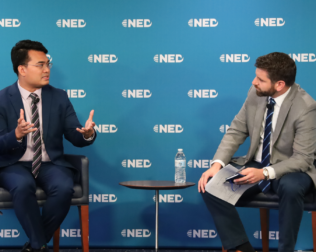By Ronald J. Deibert
Once it was conventional wisdom to assume that social media would enable greater access to information, facilitate collective organizing, and empower civil society. Now, these platforms are seen as contributing to society’s ills. Increasingly, scholars and the public at large are coming to agree about “three painful truths” concerning social media.
The first of these painful truths is that the social-media business model is based on deep and relentless surveillance of consumers’ personal data in order to target advertisements. Companies such as Google and Facebook not only provided a fresh model of how to draw revenue from internet connectivity. They have spearheaded what is called “surveillance capitalism” or the “personal-data surveillance economy,” which rests on a simple transaction: Consumers get services (mostly free of charge) while industries monitor users’ behavior in order to tailor advertisements to them. The inexorable logic of surveillance capitalism is to acquire as much data as possible about as many consumers as possible from ever more fine-grained, distributed, and overlapping sources of information. Social-media companies make money by selling third-party developers, applications, and other services access to customer data, meaning that users of one platform are unwittingly handing vast amounts of personal data to dozens of other services.
Knowledge of social media’s ills and unintended consequences is spreading, but social media as a whole remain popular, and the surveillance-based economic system underlying them is constantly expanding.
The second painful truth is that we permit this staggering level of surveillance willingly, if not altogether wittingly. Knowledge of social media’s ills and unintended consequences is spreading, but social media as a whole remain popular, and the surveillance-based economic system underlying them is constantly expanding. But do users fully understand the choices that they are making when they sign on to social media? The vast majority of users agree to “terms of service” that they do not understand or do not read. What’s more, social media stimulate us in a powerfully subconscious and hormonal way, and companies pour extraordinary resources into research aimed at heightening the emotionally compelling and even addictive aspects of social media. Our less than full “wittingness” in using social media also flows from the way the systems that we depend on and that shape our lives have increasingly receded into the background of everyday existence—always on and used constantly, but so much as a matter of course that they are taken for granted and given little critical thought.
The last and most troubling of the painful truths about social media is that they propel authoritarian practices. A recent survey by the Oxford Internet Institute found that 48 countries have at least one government agency or political party engaging in shaping public opinion through social media. Authoritarian-minded leaders routinely lambaste “fake news” while at the same time shamelessly pushing patent falsehoods. Simultaneously, the intricate surveillance that social media carry out for economic reasons is proving to be an irresistible proxy for authoritarian control. The People’s Republic of China (PRC) presents an ominous model, working with social-media conglomerates such as Alibaba and Tencent to build Orwellian-sounding social credit systems; meanwhile, companies operating in the PRC must comply with China’s 2016 cybersecurity law, which requires them to police their networks, silently censor private chats and public posts, and share user data whenever PRC authorities demand it. Autocracies the world over are proving receptive to Chinese companies and the authoritarian norms and practices they bring.
Authoritarian-minded leaders routinely lambaste “fake news” while at the same time shamelessly pushing patent falsehoods. Simultaneously, the intricate surveillance that social media carry out for economic reasons is proving to be an irresistible proxy for authoritarian control.
These painful truths add up to a bleak picture and a troubling forecast for the future of liberal democratic practices. To restore liberal democracy, we will need a wholesale change in our way of life. Citizens must gain the right to know what companies and governments are doing with all the personal data they are so assiduously collecting. It will also be crucial to extend this right internationally by holding autocratic regimes to account. We must learn to treat our information environment in the same way that we hope to treat our natural environment—as something over which we exercise stewardship and toward which we behave in a spirit of caution and restraint. If conserving energy is wise, conserving data consumption might be wise as well. Simultaneously, we must develop systems of public education with media literacy, ethics, civility, and tolerance at the foundation.
The world is crying out for technological innovations that will open up other means of distributed communication beyond the highly centralized, intensely surveilled, and too easily abused platforms of the social-media giants. The goal should be to preserve the great strides we have made in connecting people to one another and letting them access vast stores of information quickly from anywhere on the planet, but without steering them toward the indulgence of their basest instincts. We need to imagine a better world and start making it happen, before it is too late.
This post is drawn from a longer article, titled “The Road to Digital Unfreedom: Three Painful Truths About Social Media,” that appears in the January 2019 issue of the Journal of Democracy.
Ronald J. Deibert is professor of political science at the University of Toronto and director of the Citizen Lab at the University’s Munk School of Global Affairs and Public Policy. Follow him on Twitter @RonDeibert.
The views expressed in this post represent the opinions and analysis of the author and do not necessarily reflect those of the National Endowment for Democracy or its staff.
Image Credit: Lenka Horavova/Shutterstock







Comments
Democracy Research News March 2019 – NATIONAL ENDOWMENT FOR DEMOCRACY
March 12, 2019
[…] ills. Writing for the International Forum’s Power 3.0 Blog, Ron Deibert discusses “Social Media and Democracy: Three Painful Truths” and what they mean for the future of liberal democratic […]